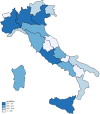Insights for Fostering Resilience in Young Adults With Multiple Sclerosis in the Aftermath of the COVID-19 Emergency: An Italian Survey
- PMID: 33692703
- PMCID: PMC7938709
- DOI: 10.3389/fpsyt.2020.588275
Insights for Fostering Resilience in Young Adults With Multiple Sclerosis in the Aftermath of the COVID-19 Emergency: An Italian Survey
Abstract
Objective: Recent evidence has demonstrated that the COVID-19 pandemic is taking a toll on the mental health of the general population. The psychological consequences might be even more severe for patients with special healthcare needs and psychological vulnerabilities due to chronic diseases, such as multiple sclerosis (MS). Thus, we aimed to explore the psychological impact of this pandemic and of the subsequent healthcare service changes on young adults with MS living in Italy and to examine their coping strategies and preferences regarding psychological support in the aftermath of the pandemic. Methods: Data were collected using a cross-sectional, web-based survey advertised on social networks. We report both quantitative (descriptive statistics, t-tests, and one-way ANOVA) and qualitative data (inductive content analysis). Results: Two hundred and forty-seven respondents (mean age 32 ± 7 years), mainly with relapsing-remitting MS, from all Italian regions participated. Participants felt more worried, confused, sad, and vulnerable because of the disease "during" the pandemic in comparison to their self-evaluation of the period "before" the COVID-19 outbreak. Similarly, their perception of control over MS decreased "during" the pandemic in comparison to the retrospective evaluation of the period "before" the COVID-19 outbreak (p < 0.01). Canceled/postponed visits/exams were listed as the most frequent MS management changes, with modified/postponed pharmacological treatment representing the most stressful change. Psychological support in dealing with pandemic-related fears and improving MS acceptance and well-being was considered extremely important by almost 40% of the respondents. Different coping strategies were mentioned in the qualitative section of the survey, with social support, hobbies, and keeping busy being the most frequent ones. Conclusions: Considering the enormous impact of the pandemic on young adults with MS, we urge MS clinical centers to implement psychological support programs that address the potentially long-lasting psychological negative impact, thus fostering the therapeutic alliance that is being threatened by the infection prevention measures imposed during the pandemic, and promoting psychological resources for adaptively managing future waves of COVID-19.
Keywords: COVID-19; coping strategies; multiple sclerosis; pandemic; psychological adjustment; psychological support; resilience.
Copyright © 2021 Donisi, Gajofatto, Mazzi, Gobbin, Busch, Ghellere and Rimondini.
Conflict of interest statement
AGa reports personal fees and non-financial support from Biogen, Merck, grants from Cesare Serono Foundation, Eurimmun, and Cariverona Foundation, outside the submitted work. The remaining authors declare that the research was conducted in the absence of any commercial or financial relationships that could be construed as a potential conflict of interest.
Figures
References
-
- Ochoa-Morales A, Hernández-Mojica T, Paz-Rodríguez F, Jara-Prado A, Trujillo-De Los Santos Z, Sánchez-Guzmán MA, et al. Quality of life in patients with multiple sclerosis and its association with depressive symptoms and physical disability. Mult Scler Relat Disord. (2019) 36:101386. 10.1016/j.msard.2019.101386 - DOI - PubMed
LinkOut - more resources
Full Text Sources
Other Literature Sources



